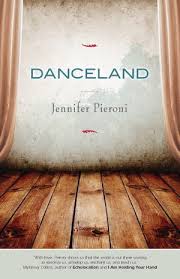150 pages, $18.95
Review by Jody Hobbs Hesler
Spare, poetic, and strange, Jennifer Pieroni’s novella, Danceland is the story of a child raised on fantasy in the wasteland of a former town. As Lettie understands it, “Their rickety cottage, its shingles loose, was all that was left of Danceland. They were Danceland’s survivors.” By day, Lettie and her father, Frank lead a life of simple sustenance. He goes off to work as a tree trimmer, and she helps with chores, such as carrying wood for their fires in bundles as “wide as Lettie’s hug.” At night, she and Frank read old reviews of her mother’s performances. All Lettie seems to know of the world is the steady regularity of her father, “a frown sticking out of a plaid overcoat,” and the mystery of Danceland, where she believes her mother once danced and entertained all comers.
Why doesn’t Lettie remember Danceland when her mother was there? Her father invents the story of a fever: “‘Higher than natural. It changed your mind and took away your memory.’” Even while Lettie believes the fiction, she “wished things would come clear, but she knew she was lost when it came to what was real.”
Lettie’s curiosity about the world beyond their drab existence develops suddenly when she is twelve. Until then, “Lettie knew no fear. Then, one day, it came.” It seems to arise from her concern over the seizures their pet cat, Nosey begins to suffer. In reaction to Lettie’s desire to find someone to help their cat, her father declares, “‘Nobody knows anything.’” Perhaps the flimsiness of this response finally overtaxes Lettie’s coming-of-age intelligence. Continue reading
![[PANK]](https://pankmagazine.com/wp-content/themes/pank/assets/images/pank-logo-large.png)

